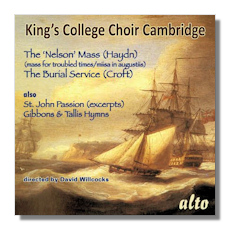
The Internet's Premier Classical Music Source
Related Links
-
Bach Reviews
Gibbons Reviews
Haydn Reviews
Tallis Reviews - Latest Reviews
- More Reviews
-
By Composer
-
Collections
DVD & Blu-ray
Books
Concert Reviews
Articles/Interviews
Software
Audio
Search Amazon
Recommended Links
Site News
 CD Review
CD Review
King's College Choir Cambridge

- Franz Joseph Haydn: Mass #11 "Missa in angustiis" (Nelson Mass), Hob XXII:11 *
- William Croft: The Burial Service
- Thomas Tallis: Glory to Thee, My God, This Night (ed. Ken)
- Orlando Gibbons: Drop, Drop Slow Tears
- Johann Sebastian Bach: St. John Passion, BWV 245 (excerpts) **
- Chorale: O Lord who dares smite thee
- Chorale: O Mighty King, Eternal is Thy Glory
- Chorus: Rest Calm…Lord Jesu, Thy dear Angel Send
* Sylvia Stahlman, soprano
* Helen Watts, mezzo-soprano
* Wilfred Brown, tenor
* Tom Krause, bass
Choir of King's College, Cambridge/David Willcocks
* London Symphony Orchestra/David Willcocks
** Philomusica of London/David Willcocks
Alto ALC1184 74:42 Rec. 1960/61
Clearly not aimed at the novice collector, neither the front or back of the box tells you which Haydn wrote the "Nelson Mass", nor does anyone tell you who "Croft" is until you actually open the box. I'm as much a classical music junkie as anybody, but I detest when labels simply assume information like names is common knowledge, or worse, that no one but an established collector would be interested in buying a disc of Haydn. The recording data is equally skimpy, with no one bothering to note that these are vintage Decca recordings. If you're going to remaster classic recordings from Decca's vaults, you might as well admit to who had them first. Even with public domain now extending to early stereo sessions, I consider it a courtesy to know who did what, first. Alto is generally very good about all my above complaints, and since I got this disc as a happy mistake, perhaps I shouldn't be complaining at all.
This is the same "Nelson Mass" that I reviewed in Decca's 50-CD "Decca Sound" box shortly after coming to Classical Net, and this is one of the only ways – if not the only way – to obtain it singly after the shutdown of Decca's "Legends" series. If memory serves, it was coupled there with Willcocks' Vivaldi Gloria, while the "Decca Sound" chose another Haydn mass led by George Guest. Fine soloists and impeccable (if not always the most thrilling) choral singers make this one of the finer accounts in the catalog. While not better than Pinnock or Gardiner, it's at least less mannered than Leonard Bernstein's somewhat heavy-handed version.
However, it's the other pieces on the disc that will probably be more interesting to collectors. Nobody would dare sing Tallis like this anymore, not with chamber choirs and historically-minded practice. That doesn't mean they shouldn't, and frankly I've sung Gibbons and Talis with nearly 90 people and it can still sound pretty fabulous. But first, William Croft's Burial Service was recorded in procession and has a certain period charm about it. Again, we probably wouldn't choose this method in making an album today. Why it's coupled with the Haydn s anyone's guess, but the singing is lovely. The Tallis perfectly fits into the College Choir's hymn repertoire, and although it sounds awfully heavy by today's standards, it's also quite majestic. The Gibbons is beautifully blended and shaped.
That leaves three selections from the Bach St. John Passion, and again it's unclear why they are here. At 14 minutes' total, I daresay Alto could have made this the secondary attraction to the Haydn instead of the Croft. Or perhaps not, because these are gorgeously sung, hopelessly old-fashioned Bach excerpts. Think Robert Shaw, with English purity of sound. There are some truly special moments: the end of the first chorale, for example. Everything else is kind of sleepy, lacking the intensity and (pardon the pun) passion of the best Bach performances, then and now. The Philomusica of London is an ensemble I had not previously heard of, and that's okay. They are faceless. Throughout, David Willcocks leads his singers exceptionally well, without the insight of the best orchestral conductors in the Haydn and Bach. All in all, this is a strange, ill-presented disc that manages to convince almost entirely due to the presence of the Choir of King's College at its early recorded peak.
Copyright © 2016, Brian Wigman


















